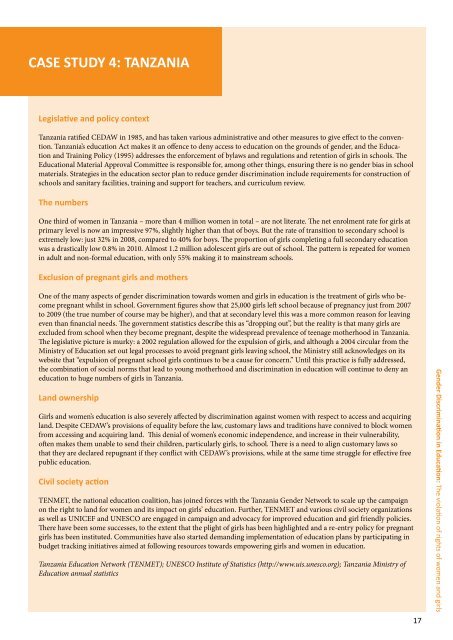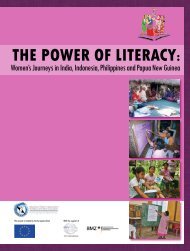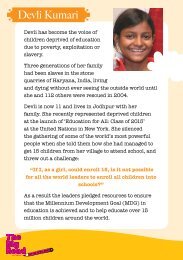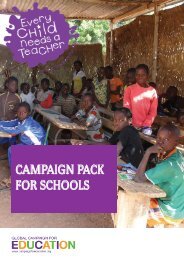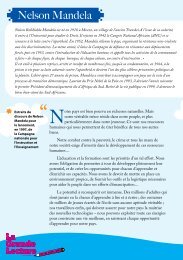Gender Discrimination in Education: The violation of rights of women ...
Gender Discrimination in Education: The violation of rights of women ...
Gender Discrimination in Education: The violation of rights of women ...
Create successful ePaper yourself
Turn your PDF publications into a flip-book with our unique Google optimized e-Paper software.
CASE STUDY 4: TANZANIA<br />
Legislative and policy context<br />
Tanzania ratified CEDAW <strong>in</strong> 1985, and has taken various adm<strong>in</strong>istrative and other measures to give effect to the convention.<br />
Tanzania’s education Act makes it an <strong>of</strong>fence to deny access to education on the grounds <strong>of</strong> gender, and the <strong>Education</strong><br />
and Tra<strong>in</strong><strong>in</strong>g Policy (1995) addresses the enforcement <strong>of</strong> bylaws and regulations and retention <strong>of</strong> girls <strong>in</strong> schools. <strong>The</strong><br />
<strong>Education</strong>al Material Approval Committee is responsible for, among other th<strong>in</strong>gs, ensur<strong>in</strong>g there is no gender bias <strong>in</strong> school<br />
materials. Strategies <strong>in</strong> the education sector plan to reduce gender discrim<strong>in</strong>ation <strong>in</strong>clude requirements for construction <strong>of</strong><br />
schools and sanitary facilities, tra<strong>in</strong><strong>in</strong>g and support for teachers, and curriculum review.<br />
<strong>The</strong> numbers<br />
One third <strong>of</strong> <strong>women</strong> <strong>in</strong> Tanzania – more than 4 million <strong>women</strong> <strong>in</strong> total – are not literate. <strong>The</strong> net enrolment rate for girls at<br />
primary level is now an impressive 97%, slightly higher than that <strong>of</strong> boys. But the rate <strong>of</strong> transition to secondary school is<br />
extremely low: just 32% <strong>in</strong> 2008, compared to 40% for boys. <strong>The</strong> proportion <strong>of</strong> girls complet<strong>in</strong>g a full secondary education<br />
was a drastically low 0.8% <strong>in</strong> 2010. Almost 1.2 million adolescent girls are out <strong>of</strong> school. <strong>The</strong> pattern is repeated for <strong>women</strong><br />
<strong>in</strong> adult and non-formal education, with only 55% mak<strong>in</strong>g it to ma<strong>in</strong>stream schools.<br />
Exclusion <strong>of</strong> pregnant girls and mothers<br />
One <strong>of</strong> the many aspects <strong>of</strong> gender discrim<strong>in</strong>ation towards <strong>women</strong> and girls <strong>in</strong> education is the treatment <strong>of</strong> girls who become<br />
pregnant whilst <strong>in</strong> school. Government figures show that 25,000 girls left school because <strong>of</strong> pregnancy just from 2007<br />
to 2009 (the true number <strong>of</strong> course may be higher), and that at secondary level this was a more common reason for leav<strong>in</strong>g<br />
even than f<strong>in</strong>ancial needs. <strong>The</strong> government statistics describe this as “dropp<strong>in</strong>g out”, but the reality is that many girls are<br />
excluded from school when they become pregnant, despite the widespread prevalence <strong>of</strong> teenage motherhood <strong>in</strong> Tanzania.<br />
<strong>The</strong> legislative picture is murky: a 2002 regulation allowed for the expulsion <strong>of</strong> girls, and although a 2004 circular from the<br />
M<strong>in</strong>istry <strong>of</strong> <strong>Education</strong> set out legal processes to avoid pregnant girls leav<strong>in</strong>g school, the M<strong>in</strong>istry still acknowledges on its<br />
website that “expulsion <strong>of</strong> pregnant school girls cont<strong>in</strong>ues to be a cause for concern.” Until this practice is fully addressed,<br />
the comb<strong>in</strong>ation <strong>of</strong> social norms that lead to young motherhood and discrim<strong>in</strong>ation <strong>in</strong> education will cont<strong>in</strong>ue to deny an<br />
education to huge numbers <strong>of</strong> girls <strong>in</strong> Tanzania.<br />
Land ownership<br />
Girls and <strong>women</strong>’s education is also severely affected by discrim<strong>in</strong>ation aga<strong>in</strong>st <strong>women</strong> with respect to access and acquir<strong>in</strong>g<br />
land. Despite CEDAW’s provisions <strong>of</strong> equality before the law, customary laws and traditions have connived to block <strong>women</strong><br />
from access<strong>in</strong>g and acquir<strong>in</strong>g land. This denial <strong>of</strong> <strong>women</strong>’s economic <strong>in</strong>dependence, and <strong>in</strong>crease <strong>in</strong> their vulnerability,<br />
<strong>of</strong>ten makes them unable to send their children, particularly girls, to school. <strong>The</strong>re is a need to align customary laws so<br />
that they are declared repugnant if they conflict with CEDAW’s provisions, while at the same time struggle for effective free<br />
public education.<br />
Civil society action<br />
TENMET, the national education coalition, has jo<strong>in</strong>ed forces with the Tanzania <strong>Gender</strong> Network to scale up the campaign<br />
on the right to land for <strong>women</strong> and its impact on girls’ education. Further, TENMET and various civil society organizations<br />
as well as UNICEF and UNESCO are engaged <strong>in</strong> campaign and advocacy for improved education and girl friendly policies.<br />
<strong>The</strong>re have been some successes, to the extent that the plight <strong>of</strong> girls has been highlighted and a re-entry policy for pregnant<br />
girls has been <strong>in</strong>stituted. Communities have also started demand<strong>in</strong>g implementation <strong>of</strong> education plans by participat<strong>in</strong>g <strong>in</strong><br />
budget track<strong>in</strong>g <strong>in</strong>itiatives aimed at follow<strong>in</strong>g resources towards empower<strong>in</strong>g girls and <strong>women</strong> <strong>in</strong> education.<br />
Tanzania <strong>Education</strong> Network (TENMET); UNESCO Institute <strong>of</strong> Statistics (http://www.uis.unesco.org); Tanzania M<strong>in</strong>istry <strong>of</strong><br />
<strong>Education</strong> annual statistics<br />
17<br />
<strong>Gender</strong> <strong>Discrim<strong>in</strong>ation</strong> <strong>in</strong> <strong>Education</strong>: <strong>The</strong> <strong>violation</strong> <strong>of</strong> <strong>rights</strong> <strong>of</strong> <strong>women</strong> and girls


